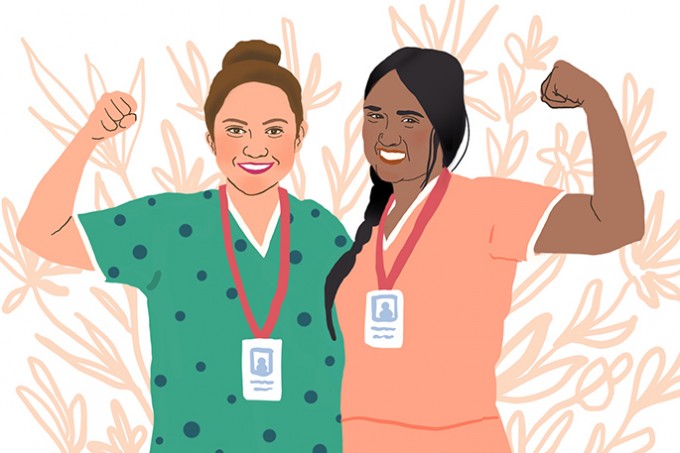Feature
FLOURISH!
Meaningful steps to increase personal resilience and be your best self - even during a pandemic

This is an extraordinarily challenging time to be a nurse. The COVID-19 pandemic is stretching many of us to the limit and beyond, as we work overtime to treat anxious, frustrated patients while trying to come to grips with rapidly changing guidelines, supply shortages and the awareness that our own families are also at risk.
Worse, during a crisis like this, the stress doesn’t end when we clock out. Going home to scrounge up some dinner from nearly bare shelves while panicky talking heads on the TV warn of the latest case counts does nothing to improve your state of mind. It’s a recipe for overwhelm, exhaustion and burnout.
New Grad Burnout
The hard truth is that even before the COVID-19 crisis became a pandemic, many nurses were already dangerously close to burnout. This is nothing new for our profession, and it’s a problem that starts early.
I have vivid memories of my first nursing job as a new graduate, sitting in the conference room to take change-of-shift reports from nurses just coming off the night shift. A few managed to crack a smile, but others were dreary and red-eyed, complaining about heavy patient loads, inadequate staffing and having to finish work for other nurses.
Even in my first week, colleagues asked, “Why on earth did you go into nursing? This is a thankless job.” By the end of my residency, I was already so burned out by the stress and negativity that I jumped at a chance to join the staff of a physician group.
Although that was years ago, many new grads today could tell similar stories.
A Profession in Crisis
In October 2019, the National Academy of Medicine (NAM) released a widely anticipated report, Taking Action Against Clinician Burnout: A Systems Approach to Professional Wellbeing, a culmination of two years of research.
The report cites research suggesting that more than half of all clinicians — including nurses and physicians across the United States — experience symptoms of professional burnout, depression and suicidality. This is a bona fide public health epidemic that is adversely affecting the quality and safety of U.S. healthcare.
For nurses, burnout manifests as emotional exhaustion; feelings of ineffectiveness and cynicism; no longer finding work meaningful; and a tendency to view patients, students and colleagues as objects rather than human beings. Burnout reduces job satisfaction; contributes to medical errors and poorer patient satisfaction; and increases rates of alcohol and drug abuse, self-harm and suicide. It’s a serious danger to your physical and mental health.
Risk Factors at Home and at Work
The NAM report affirms something nurses already know: that burnout can have both personal and workplace causes. Personal risk factors include not practicing self-care or healthy lifestyle behaviors.


